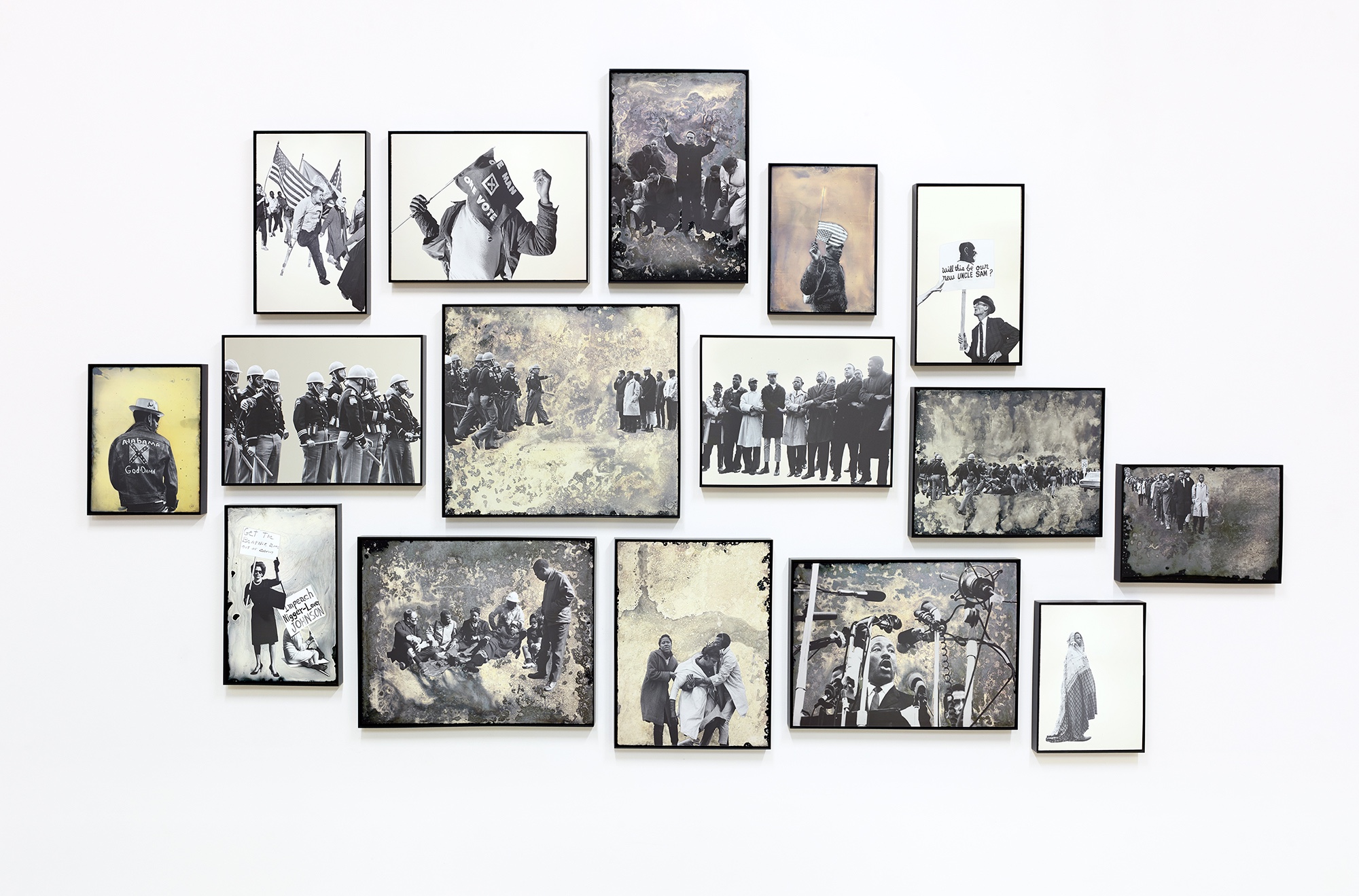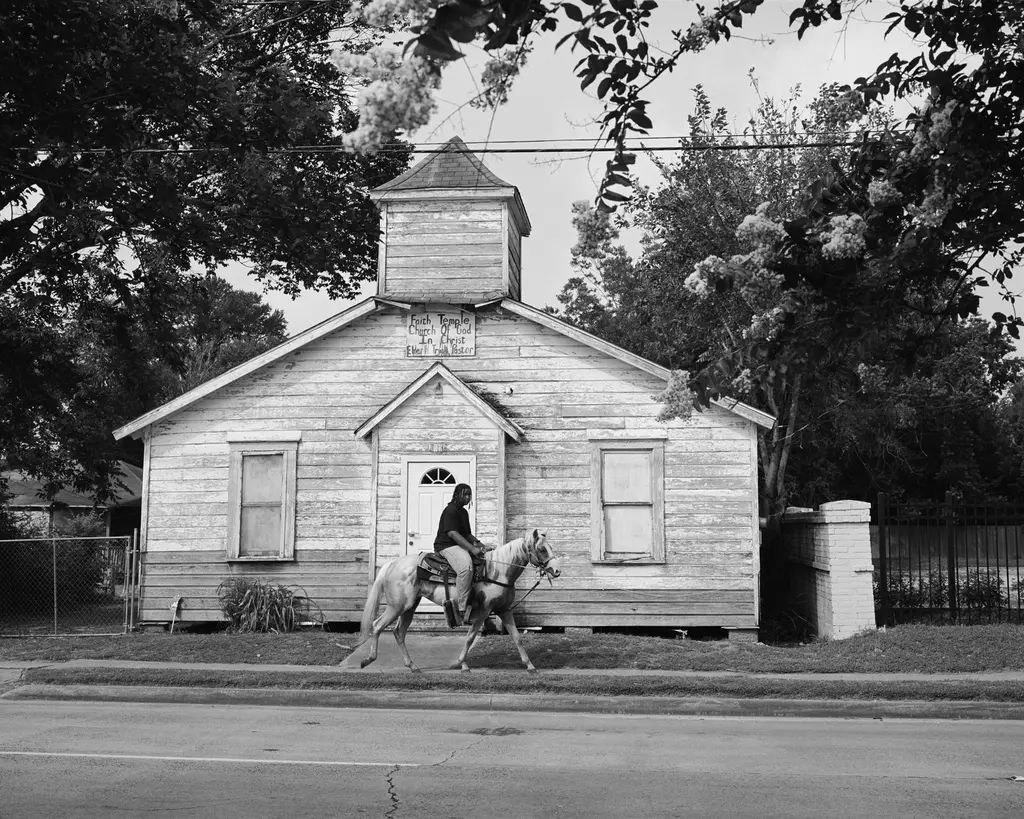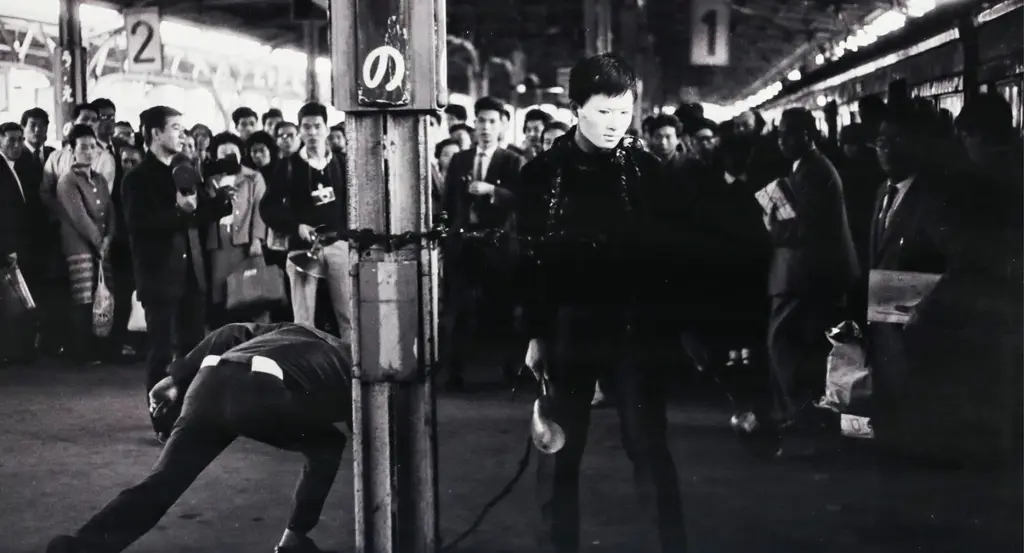‘Artists make work because they have to. It’s survival’
- Text by Miss Rosen
- Photography by Hank Willis Thomas

For African-American artist Hank Willis Thomas, politics infuses every aspect of life; from his daily existence to the ideas that inform his art.
“I think being a person is political,” Thomas says. “I have a hard time separating my identity as a human being from politics, because how I am categorised by society affects how I am valued — and how I am valued affects my survival, which is by definition political. I have never been able to separate my work from myself. I think artists tend to make work because they have to, literally, it’s an act of survival.”
This understanding is at the very heart of his work, which is sumptuously showcased inside the satin-covered monograph, All Things Being Equal (Aperture/Portland Museum of Art). It’s a mid-career survey that spans more than a decade of work exploring ideas of identity, representation, and visibility in fine art, pop culture, and history.

Ain’t Gonna Let Nobody Turn Us Around, 2016 (installation); from Hank Willis Thomas: All Things Being Equal (Aperture/Portland Art Museum, 2018).
“I think a lot about George Orwell’s 1984,” Thomas continues. “There’s a line in it: ‘He who controls the past controls the future. He who controls the present controls the past.’ I think that is how history works. If I can tell you how things happened that led us to where things are, I can dictate where we are going.”
But Thomas is less interested in controlling the narrative than questioning the ways in which visual media informs our beliefs. As the son of Dr Deborah Willis, curator and librarian at the Schomburg Center for Research in Black Culture in New York, Thomas grew up around artists like Carrie Mae Weems, Gordon Parks, Roy DeCarava, James Van Der Zee, not realising they were historical figures at the time.
“Everything comes from having grown up in the library and the Schomburg,” he explains. “You realise how many important stories are hidden in these archives that only people with special passes or special curiosity have access to. I realise that history is not something empirical; it is the stories we tell ourselves and one another about who we are, how we came to be, what is important, and what is unimportant.”

If You Can’t Fly Then Run (Golden Eyes) (variations without and with flash), 2018; from Hank Willis Thomas: All Things Being Equal (Aperture/Portland Art Museum, 2018).
Working across a wide array of media including photography, sculpture, collage, graphic design, word art and fabric arts, Thomas investigates the relationship between what we see and how we think.
“Journalism so often tells you what to think, as does design. But art, at its best, is asking you a question or provoking you to think instead of leading you in a specific direction.”
“There’s an unconscious thing we have: if it’s in the newspaper or on the first page of Google, it must be true. Artists are rarely comfortable with that logic or understanding. I am hoping a healthy amount of scepticism or curiosity can raise the dialogue. As photographers, one of the first things we learn about are our own biases. I am as distracted as anyone else. If I can’t see past the headline and what that means, what am I really looking at then?”

In Search of the Truth (The Truth Booth), 2011–ongoing (installation); from Hank Willis Thomas: All Things Being Equal (Aperture/Portland Art Museum, 2018).

Icarus, 2016; from Hank Willis Thomas: All Things Being Equal (Aperture/Portland Art Museum, 2018).

ALL LI ES MATTER, 2017, from the series My New York, 50 New York Covers: A Public Art Project; from Hank Willis Thomas: All Things Being Equal (Aperture/Portland Art Museum, 2018).

For Freedoms, Make America Great Again, 2016 (installation); from Hank Willis Thomas: All Things Being Equal (Aperture/Portland Art Museum, 2018). On view in Pearl, Mississippi, 2016. Vinyl billboard. Original photograph by Spider Martin, 1965

Hank Willis Thomas in collaboration with Sanford Biggers,
Crossroads, 2012, from the series The Wayfarer; from Hank Willis Thomas: All Things Being Equal (Aperture/Portland Art Museum, 2018).

The Cotton Bowl, 2011, from the series Strange Fruit; from Hank Willis Thomas: All Things Being Equal (Aperture/Portland Art Museum, 2018).
All Things Being Equal is available now via Aperture/Portland Museum of Art.
Follow Miss Rosen on Twitter.
Enjoyed this article? Like Huck on Facebook or follow us on Twitter.
You might like

A reading of the names of children killed in Gaza lasts over 18 hours
Choose Love — The vigil was held outside of the UK’s Houses of Parliament, with the likes of Steve Coogan, Chris O’Dowd, Nadhia Sawalha and Misan Harriman taking part.
Written by: Isaac Muk

Rahim Fortune’s dreamlike vision of the Black American South
Reflections — In the Texas native’s debut solo show, he weaves familial history and documentary photography to challenge the region’s visual tropes.
Written by: Miss Rosen

Meet the hair-raised radicals of Berlin’s noise punk scene
Powertool — In his new zine, George Nebieridze captures moments of loud rage and quiet intimacy of the German capital’s bands, while exploring the intersections between music, community and anti-establishment politics.
Written by: Miss Rosen

Capturing joy and resilience in Istanbul through tumultuous times
Flowers in Concrete — As protests break out across Istanbul, photographer Sıla Yalazan reflects on the 2013 Gezi Park movement, and capturing beauty as the city has undergone economic change and political tension.
Written by: Isaac Muk

A new documentary explores Japan’s radical post-war photography and arts scene
Avant-Garde Pioneers — Focusing on the likes of Daidō Moriyama, Nobuyoshi Araki, Eikoh Hosoe and many more, the film highlights the swell of creativity in the ’60s, at a time of huge economic change coupled with cultural tensions.
Written by: Isaac Muk

From his skating past to sculpting present, Arran Gregory revels in the organic
Sensing Earth Space — Having risen to prominence as an affiliate of Wayward Gallery and Slam City Skates, the shredder turned artist creates unique, temporal pieces out of earthly materials. Dorrell Merritt caught up with him to find out more about his creative process.
Written by: Dorrell Merritt